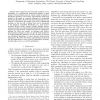Free Online Productivity Tools
i2Speak
i2Symbol
i2OCR
iTex2Img
iWeb2Print
iWeb2Shot
i2Type
iPdf2Split
iPdf2Merge
i2Bopomofo
i2Arabic
i2Style
i2Image
i2PDF
iLatex2Rtf
Sci2ools
INFOCOM
2010
IEEE
2010
IEEE
Markov Approximation for Combinatorial Network Optimization
—Many important network design problems can be formulated as a combinatorial optimization problem. A large number of such problems, however, cannot readily be tackled by distributed algorithms. The Markov approximation framework studied in this paper is a general technique for synthesizing distributed algorithms. We show that when using the log-sum-exp function to approximate the optimal value of any combinatorial problem, we end up with a solution that can be interpreted as the stationary probability distribution of a class of timereversible Markov chains. Certain carefully designed Markov chains among this class yield distributed algorithms that solve the log-sum-exp approximated combinatorial network optimization problem. By three case studies, we illustrate that Markov approximation technique not only can provide fresh perspective to existing distributed solutions, but also can help us generate new distributed algorithms in various domains with provable performance. We believe th...
Communications | INFOCOM 2010 | Markov Approximation | Markov Approximation Framework | Optimization Problems |
Related Content
| Added | 28 Jan 2011 |
| Updated | 28 Jan 2011 |
| Type | Journal |
| Year | 2010 |
| Where | INFOCOM |
| Authors | Minghua Chen, Soung Chang Liew, Ziyu Shao, Caihong Kai |
Comments (0)

